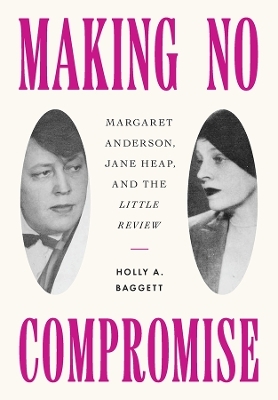
Making No Compromise
Margaret Anderson, Jane Heap, and the "Little Review"
Seiten
2023
Northern Illinois University Press (Verlag)
978-1-5017-7144-6 (ISBN)
Northern Illinois University Press (Verlag)
978-1-5017-7144-6 (ISBN)
Making No Compromise is the first book-length account of the lives and editorial careers of Margaret Anderson and Jane Heap, the women who founded the avant-garde journal the Little Review in Chicago in 1914.
Born in the nineteenth-century Midwest, Anderson and Heap grew up to be iconoclastic rebels, living openly as lesbians, and advocating causes from anarchy to feminism and free love. Their lives and work shattered cultural, social, and sexual norms. As their paths crisscrossed Chicago, New York, Paris, and Europe; two World Wars; and a parade of the most celebrated artists of their time, they transformed themselves and their journal into major forces for shifting perspectives on literature and art.
Imagism, Dada, surrealism, and Machine Age aesthetics were among the radical trends the Little Review promoted and introduced to US audiences. Anderson and Heap published the early work of the "men of 1914"—Ezra Pound, James Joyce, William Butler Yeats, and T. S. Eliot—and promoted women writers such as Djuna Barnes, May Sinclair, Dorothy Richardson, Mina Loy, Mary Butts, and the inimitable Baroness Elsa von Freytag-Loringhoven. In the mid-1920s Anderson and Heap became adherents of George I. Gurdjieff, a Russian mystic, and in 1929 ceased publication of the Little Review.
Holly A. Baggett examines the roles of radical politics, sexuality, modernism, and spirituality and suggests that Anderson and Heap's interest in esoteric questions was evident from the early days of the Little Review. Making No Compromise tells the story of two women who played an important role in shaping modernism.
Born in the nineteenth-century Midwest, Anderson and Heap grew up to be iconoclastic rebels, living openly as lesbians, and advocating causes from anarchy to feminism and free love. Their lives and work shattered cultural, social, and sexual norms. As their paths crisscrossed Chicago, New York, Paris, and Europe; two World Wars; and a parade of the most celebrated artists of their time, they transformed themselves and their journal into major forces for shifting perspectives on literature and art.
Imagism, Dada, surrealism, and Machine Age aesthetics were among the radical trends the Little Review promoted and introduced to US audiences. Anderson and Heap published the early work of the "men of 1914"—Ezra Pound, James Joyce, William Butler Yeats, and T. S. Eliot—and promoted women writers such as Djuna Barnes, May Sinclair, Dorothy Richardson, Mina Loy, Mary Butts, and the inimitable Baroness Elsa von Freytag-Loringhoven. In the mid-1920s Anderson and Heap became adherents of George I. Gurdjieff, a Russian mystic, and in 1929 ceased publication of the Little Review.
Holly A. Baggett examines the roles of radical politics, sexuality, modernism, and spirituality and suggests that Anderson and Heap's interest in esoteric questions was evident from the early days of the Little Review. Making No Compromise tells the story of two women who played an important role in shaping modernism.
Holly A. Baggett is Professor of History in Missouri State University, and the editor of Dear Tiny Heart: The Letters of Jane Heap and Florence Reynolds.
Introduction
1. The Buzz and the Sting
2. Temples of Tomorrow: Anderson and the Little Review, 1914–1916
3. Political and Literary Radicals
4. Interregnum: Chicago, San Francisco, New York
5. Pound, Yeats, Eliot, and Joyce
6. Lesbian Literature, Women Writers, and Modernist Mysticism
7. George Ivanovich Gurdjieff: A Messenger BetweenTwo Worlds
8. The Heap Era
Epilogue: Post–Little Review Years
| Erscheinungsdatum | 17.10.2023 |
|---|---|
| Zusatzinfo | 21 Halftones, black and white |
| Sprache | englisch |
| Maße | 152 x 229 mm |
| Gewicht | 907 g |
| Themenwelt | Literatur ► Biografien / Erfahrungsberichte |
| Sozialwissenschaften ► Soziologie ► Gender Studies | |
| ISBN-10 | 1-5017-7144-2 / 1501771442 |
| ISBN-13 | 978-1-5017-7144-6 / 9781501771446 |
| Zustand | Neuware |
| Haben Sie eine Frage zum Produkt? |
Mehr entdecken
aus dem Bereich
aus dem Bereich
wie sich das weibliche Gehirn jetzt verändert und Sie diese neue …
Buch | Hardcover (2023)
Mosaik (Verlag)
CHF 36,90
eine kritische Theorie in 99 Fragmenten
Buch | Softcover (2023)
Campus (Verlag)
CHF 55,95


